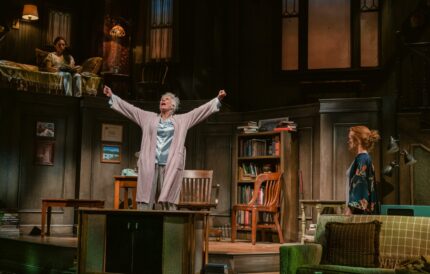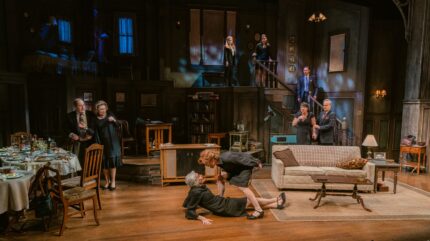
Pill-addicted razor-mouthed Violet (Sara Morsey) lets loose as housekeeper Johnna (Ryffin Phoenix) and daughter Barbara (Kathy McCafferty) listen / Photos by Alicia Donelan
By Bill Hirschman
“Home is the place where, when you have to go there, they have to take you in.”
—-Robert Frost
What Mr. Frost failed to acknowledge is that sometimes home is the last place you’d ought to go for solace or support.
Certainly, that’s the Weston family manse in the desolate prairie of Oklahoma as depicted in Palm Beach Dramaworks’ searing, devastating portrait of toxic family dysfunction in Tracy Lett’s masterpiece, August: Osage County.
As one daughter observes, “I can’t perpetuate these myths of family or sisterhood anymore. We’re all just people, some of us accidentally connected by genetics, a random selection of cells. Nothing more.”
As superb an ensemble as anyone could ask for, featuring bravura performances from Sara Morsey and Kathy McCafferty, has been expertly molded by director William Hayes – although it’s a tad unfair to spotlight anyone connected to this perfectly fused streams of artistic effort.
I’ve seen several Osage productions including the original Broadway cast – all of them excellent in the exact sense of the word. But this edition is arguably finer than most of them – well worth investing your time and commitment to a three-act evening.
Letts limns a large extended family of three generations whose every member has been damaged directly or indirectly by the previous generation, then has passed on the infectious wounds to the next. Now in the final act of a century’s erosion, it finally implodes as secrets and long-nursed recriminations are wielded like weapons.
But the real weapon of choice is truth, cutting through the pretensions people have adopted in their years away from the family and the lies they told themselves and others.
Everyone has levels and depths that are not immediately apparent. By the end of the evening, no one is quite the person you thought they were when they first appeared or even through the first two acts.
And while there are some massive explosions that involve physical grappling, one person observes quite keenly, “Dissipation is actually much worse than cataclysm.”
Yet this three-act odyssey is appropriately billed as a tragi-comedy. Incredibly, this is not depressing. These articulate and intelligent protagonists have developed sharp whipcracks of jet black cutting humor as a defense mechanism and counter-attack. So the audience catches itself frequently guffawing and chuckling – in between gasps as loved ones inflict razor sharp insults and blunt digs that only a loved one would know to use. The past is always present.
Trying to encapsulate the epic-sized plot: Some of the estranged family has gathered from across the country because the melancholy patriarch Beverley (Dennis Creaghan), an alcoholic burned-out poet, has vanished. He has left his pill-addicted razor-tongued foul-mouthed wife Violet (Sara Morsey) alone with their middle daughter Ivy (Margery Lowe). Ivy is a sensitive suffocated soul who resents being trapped as her parents’ caregiver and wants to escape with a secret lover.
Violet (ironically coping with mouth cancer) spends some of the time stumbling about in a pill-fog, sometimes in a loose drunken ramble, but occasionally in a clear mind that is quite perceptive – that being the worst mode because she ruthlessly slices through everyone’s defenses. But she cannot take care of herself much of the time, even though Beverley hired Johnna (Ryffin Phoenix), a young Cheyenne woman, as housekeeper.
Oldest daughter Barbara (Kathy McCafferty), a Colorado professor burned out from past campaigns to conquer her mother’s addiction, arrives from Tulsa with her separated husband Bill (Bruce Linser) who is having an affair with one of his students, and 14-year-old daughter Jean (Allie Beltran), a quirky teen deep into puberty and marijuana. Barbara, who is trying to impose control on the chaos, can be furious with her mother’s endless abusiveness, but can instantly become compassionate and caring when Violet melts down.
Violet’s sister, the unbending Mattie Fae (Laura Turnbull), can be equally cruel and mean to her emotionally-stunted grown son Little Charlie (Iain Batchelor), as her husband Charlie (Steve Trovillion) keeps his equilibrium.
When it turns out Beverley is dead, the rest of the family converges including the youngest daughter Karen (Niki Fridh) who has had her share of failed relationships and who comes to show off her fiancé Steve (Christopher Daftsios), a shady Florida businessman with an unfettered yen for young girls like Jean. Closing out the party on occasion is Sheriff Deon Gilbeau (David A. Hyland) who had a crush on Barbara in high school and still does.
For three fluid never-boring acts over three hours and 20 minutes, August depicts a death spiral in which familial bonds first disintegrate molecule by molecule, then are ripped apart. And yet the humor is threaded throughout such as Trovillion’s hilarious protracted grace that Charlie stumbles through at the family dinner.
It is an encyclopedia of relationships encompassing love, anger and pain – sometimes in the same person in the same scene – enough to fill a season of soap opera. But, believe it, this never feels like a soap opera, it feels like a 21st Century Greek tragedy.
In this 2008 Pulitzer-winner, Letts’ dialogue is rubber band snappy, but he allows characters speeches that are the playwright eloquently airing his own anxiety. For instance, Barbara recalls speaking with her father:
“And he said, ‘You know, the country was always pretty much a whorehouse, but at least it used to have some promise. Now it’s just a shithole.’ … But there was something sad in his voice – or no, not sad, he always sounded sad – something more hopeless than that. As if it had already happened. As if whatever was disappearing already disappeared. As if it was too late. As if it was already over. And no one saw it go. This country. This experiment, America, this hubris, what a lament if no one saw it go. Here today, gone tomorrow.”
Likely only theater pros will see how Hayes has masterfully fashioned this journey. He has paced this wide range of interactions perfectly, elicited insightful complex performances from his cast, polished the procession of dialogue, invisibly staged the action, and inserted or encouraged scores of grace notes such as people reaching to out to touch someone who either pulls away or isn’t even paying attention.
Among the most visibly outstanding aspects are the performances of Morsey and McCafferty.
Morsey, who starred in GableStage’s The Year of Magical Thinking in June, played this role about 12 years ago at Florida Rep in Fort Myers, when she said she was not really old enough. But her work now is among the best you will see all season.
Her sharp-featured Violet is a terrible force of nature as her rasping sandpaper screech skewers and slices everyone around her. Even when her tall frame is standing still, her body seems to be vibrating. Yet she makes it clear that Violet is herself a product of a nightmarish childhood. Especially, Morsey is incredibly convincing when Violet’s mind is battling through the fog to express herself through slurred shrill speech.
McCafferty creates a far different creature than her Blanche in Dramaworks’ A Streetcar Named Desire in 2019. Her complex Barbara is clearly struggling with a half-dozen challenges from trying to keep the family from imploding to dealing with the infidelity of a husband she still feels a connection with. The actress excels at creating a Barbara who initially seems to be able – barely able – to keep everything together, but who over the course of the play circles down the drain to approach becoming her mother.
Again, while these two have the meatiest roles, every last member of the cast deserves the highest praise.
As always, Dramaworks’ modest staff of designers and crew prove themselves among the best in the region. Michael Amico once again and tiny crew of three create an atmospheric two-story living arena that could have been built early in the last century after statehood, whose crevices are further explored by Kirk Bookman’s supple lighting. Brian O’Keefe’s costuming helps reveals characters, especially people parading in mis-matched pieces as the family formality disintegrates during the weekend.
In a season like this, this critic worries that his standards have fallen because of the seemingly superior quality of show after show. Creative artistic talents unleashed after the pandemic have taken advantage of the reopened opportunities with an energy, imagination and pure skill that is at least the equal and often surpassing efforts of a few years ago. The list is long of companies gifting some of the best work of their recent past.
This production comes in the top rank of that list.
August: Osage County runs through April 16 at Palm Beach Dramaworks, 201 Clematis St., West Palm Beach. Performances 7:30 p.m. Wednesday-Sunday, 2 p.m. Wednesday, Saturday and Sunday. Shows begin promptly on time. Running time is 3 hours 20 minutes including two intermissions. Tickets $84. Student tickets for $15, and anyone under 40 pays $40 with a photo ID. Tickets for educators are half price with proper ID (other restrictions apply). Call (561) 514-4042 ext. 2, or online at palmbeachdramaworks.org.
Because of congestion downtown, the theater recommends allowing ample time to find parking. Ticketholders arriving late will be subject to a seating hold in the lobby until an appropriate time in the play. Latecomers will be seated at the house manager’s discretion.
A parking map is available here https://www.palmbeachdramaworks.org/planyourvisit/directions-parking
To read a preview feature on the production, click here.










 A PaperStreet Web Design
A PaperStreet Web Design
